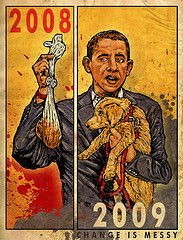For starters, automobile emissions account for a mere 17% of carbon emissions into the atmosphere. These new CAFE standards will have a minimal impact on the environment.
The new standards will cause auto prices to rise $1300 more per vehicle. What is the cost benefit here? It's ridiculous.
In a nutshell, CAFE standards require any given auto maker to have an average Fuel Economy of a fixed number. So, an SUV which may get 15 -20 MPG must be offset by a "green" putt-putt car or hybrid which nobody wants -- one of the reasons why the auto makers are currently struggling.
"Partial Commen Sense"
The original Cafe Standards legislation was enacted to counter an OPEC oil embargo by making an effort to reduce America's dependence on foreign oil.
Over 30 years later, we are still dependant upon foreign oil, if not moreso. So in that sense, CAFE has failed.
In addition, one major factor in producing more fuel-efficient cars is the cars become lighter and less safe. Auto fatalities in these types of cars have increased. So what is the benefit of "saving the planet" if people are not around to see it?
Finally, statistics show that the more fuel efficient a car becomes, the more the owner will drive! So any "per mile" savings in emissions will be offset with increased driving!
Obama's proposal has nothing to do with reducing energy Independence or protecting the environment and everything to do with pandering to a very powerful, very wealthy voting block -- the Environmental Wing of the Democratic party. Make no mistake -- while Obama continues to blast Wall Street and attack "greed" as wrong, he is helping out the industry of "climate-change".
Yet again, Democrats are placing politics over principle; garnering votes ahead of actually helping Americans.
History of CAFE Standards:
In 1975, the U.S. Congress assigned responsibility for setting automobile mileage standards to the National Highway Transportation Safety Administration (NHTSA), which is housed within the U.S. Department of Transportation.
In 2002, the State of California passed AB 1493, legislation which regulated auto carbon dioxide (CO2) emissions and fuel economy.
In 2004, the State of California finalized carbon dioxide regulations for automobiles. Automakers challenged the state action in federal court, saying only the federal government can set mileage standards to ensure a consistent fuel economy program across the country.
In April 2007, the U.S. Supreme Court ruled that the Environmental Protection Agency (EPA)should review possible dangers from CO2 emissions.
In December 2007, automakers supported Congress passing the Energy Independence and Security Act requiring automakers to increase fuel economy by at least 40% to 35 mpg -- thereby reducing CO2 by at least 30% -- by 2020.
In 2008, the Bush Administration denied California's request for a waiver from the federal Clean Air Act to implement its own CO2 program.
In January 2009, President Obama directed EPA to review the waiver decision.
In March, NHTSA raised Corporate Average Fuel Economy (CAFE) standards for cars in model year 2011 to 30.2 mpg, and a combined standard for cars and light trucks (minivans, SUVs, pickups) to 27.3 mpg. (The standard is based on what consumers purchase. That is, the standard represents the average mileage achieved by all vehicles sold by a manufacturer.)
In April, EPA issued a proposed finding that CO2 poses a danger to health and welfare, opening the door to federal regulation of CO2 from all sources. The U.S. House of Representatives also began hearings on climate change legislation during April.






No comments:
Post a Comment